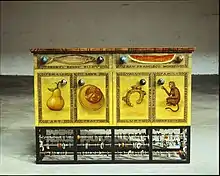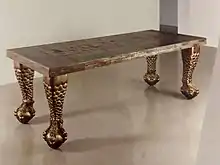_by_Cheryl_R._Riley.jpg.webp)
.jpg.webp)
Cheryl R. Riley (born 1952)[1] is an American artist and furniture designer. Her official website is cherylrriley.com/
Career
Furniture Design
.jpg.webp)
Riley pursued a career in advertising and fashion before focusing on furniture design.[1] In 1986, Riley formed Right Angle Designs in San Francisco, starting out by designing and producing furniture.[1][2] She is said to be one of the only female African American designers to establish a national reputation for her furniture design.[1]

.jpg.webp)
Her work in furniture designer is exhibited and permanently displayed in museums throughout the United States, including Coin Encrusted Tudor Tables II & III (1992) at the Cooper Hewitt National Design Museum,[3] Sunburst and Starburst Chairs (1994) and de Medici Cabinets (1994) at the Oakland Museum of California,[4] Zulu Renaissance Writing Table for a Lady (1995)[1] and Hunter’s Screen (1994-1998) at the San Francisco Museum of Modern Art,[5] and Bakuba Griffin Dining Table (1992) at The Mint Museum in Charlotte, NC.[6]
The Zulu Renaissance Table (1995-1996) will be exhibiting at the Montreal Museum of Fine Arts from the Francisco Museum of Modern Arts[7]’ permanent collection. The exhibition is called “Parall(elles) A History of Women in Design” [8] and curated by Jennifer Laurent, Curator of Decorative Arts and Design Musée des beaux-arts de Montréal.[9] Organized in collaboration with the Stewart Program for Modern Design, this major exhibition celebrates the instrumental role women have played in the world of design through a rich corpus of art works and objects dating from the mid-19th century onwards. In addition, it examines the reasons why women are underrepresented in the history of this discipline and encourages an expanded understanding of what constitutes design.[8]

Riley's furniture design work has been featured in over 60 group shows throughout the United States and several solo shows in New York and California, including the Smithsonian's Cooper-Hewitt Design Museum in 1993.[1][10]
Cheryl R. Riley's furniture design were recognized in the New York Times article "9 Furniture Designers from Across the African Diaspora."[2]
Other work
The cities of San Francisco, New York, Atlanta, and Sacramento have commissioned Riley for murals and sculptures since the inception of Right Angle Designs.[11] She designed the interior of the public lobby of Bayview Police Station in Bayview-Hunters Point, San Francisco, from 1991 to 1997.[12] In 2000, Riley was hired to design the mural, "MBUTI WOMEN" (2000) in San Francisco, CA Bayview District.
Riley was commissioned to design the awards statue for the American Black Film Festival (then called the Acapulco Black Film Festival Awards). In 2019, the award was acquired by the Smithsonian's National Museum of African American History and Culture for their permanent collection.[13]

.png.webp)
.jpg.webp)
Her "GLYPH" series is a visual vocabulary system painted on vintage encyclopedia pages.[14] In 2019, her 300 glyphs were on display in the group show “Woven” at The Arts Center of Greenwood in South Carolina.[15]
Riley's "TRANSCENDENCE PRESERVED" (2017-2018) sculpture series was featured in shows such as "Amulets Ethereal" at the Barney Savage Gallery in New York.[16]
As an advocate for artists of the Black African Diaspora, Riley has long utilized different portals to educate and illuminate. One venue has been writing about artists for publications geared, primarily, to the African American audience. She's penned profiles of Lyle Ashton Harris,[17] Kara Walker,[18] and Gary Simmons[19] for Ebony. Riley has also written about the Studio Museum in Harlem for Essence,[20] a series of columns for Uptown about art's rising stars,[21][22][23][24] and a profile of Mickalene Thomas for aRUDE.[25] In addition to writing an exploration of African American art in Jersey City, NJ,[26] Riley also appeared on the cover of the Winter 2019 issue of Jersey City Magazine alongside her piece, "150 Bay Street: A Creative haven honors the Promise of the Powerhouse Arts District."[27]
The patterns on Riley's African Textile Glass Panels, displayed at the Hartsfield-Jackson Atlanta International Airport, hark back to our ancestors in Africa, the mother continent for all humans. The layers are both horizontal and three-dimensional, the stacked design is achieved by carving into the front and back of the glass and applying a variety of tissue thin metal lead sheets to the back.[28][29]
| Work Featured | Title | Author(s) | Year |
|---|---|---|---|
| Chair for a Renaissance Queen | Chairmania: Fantastic Miniatures[30] | George Beylerian | 1994 |
| Coin Encrusted Tudor Tables III & IV | America's Smithsonian: Celebrating 150 Years[31] | Smithsonian Institution, Jack Kirshbaum | 1996 |
| Bakuba Griffin Dining Table | The Spirit of African Design[32] | Sharne Algotsson, Denys Davis | 1996 |
| Talking Head Cabinet | |||
| Nefertiti Office Chair | |||
| Luba Yoruba Wooden Chest | |||
| Coin-Encrusted Tudor Table III | |||
| Zanzibar Table | |||
| Starburst Chair | |||
| Hunter Screen | |||
| Scheherazade Bed | |||
| Dogon Chair | Harlem Style: Designing for the New Urban Aesthetic[33] | Roderick N. Shade, Jorge S. Arango | 2002 |
| Dogon Mirror | |||
| Bayview Police Station (Akamba Inlay Floor, Maasai Warrior Shield, Light Sconces, Granary Bobo Bench) | San Francisco: Arts for the City : Civic Art and Urban Change, 1932-2012[34] | Susan Wels | 2013 |
| Ndebele Wall Panels | |||
| On Target Podium |
References
- 1 2 3 4 5 6 Kirkham, Pat (2000). Women designers in the USA, 1900-2000 : diversity and difference : Jacqueline M. Atkins [and others]. Published in conjunction with the exhibition held at the Bard Graduate Center for Studies in the Decorative Arts, Design, and Culture from Nov. 15, 2000 to Feb. 25, 2001. New Haven, CT: Yale University Press. ISBN 0-300-08734-9. OCLC 45486311.
- 1 2 "Cheryl R. Riley, Tudor Coin Encrusted Table, 1992". National Museum of African American History and Culture. 2017-10-18. Retrieved 2020-02-21.
- ↑ "Tudor Coin Encrusted Table Table, 1992". Cooper Hewitt, Smithsonian Design Museum. Retrieved 2020-02-13.
- ↑ "A Conversation and Makers Mixer". Archived from the original on 2022-06-25. Retrieved 2020-12-10.
- ↑ "Queer Art Workers Reflect: Cheryl R. Riley Thinks Queer Artists "Should Not be Ghettoized"". 9 June 2020.
- ↑ "In the MAD Loupe: Cheryl R. Riley".
- ↑ "San Francisco Museum of Modern Art", Wikipedia, 2022-10-31, retrieved 2023-02-03
- 1 2 "Parall(elles) A History of Women in Design | Montréal Downtown | Major exhibitions - Montréal". Bonjour Québec. Retrieved 2023-02-03.
- ↑ "Jennifer Laurent Joins Montreal Museum of Fine Arts as Curator of Modern and Contemporary Decorative Arts". Artforum. 2019-05-29. Retrieved 2023-02-03.
- ↑ Seiler, Andy (1993-06-18). "Collector revamps museum's image". The Courier-News. p. 39. Retrieved 2020-06-30.
- ↑ Sims, Lowery Stokes; King-Hammond, Leslie; Beckwith, Naomi; D'Alton, Martina (2010). THE GLOBAL AFRICA PROJECT. Published in conjunction with the exhibition, The global Africa project, organized by the Museum of Arts and Design, November 17, 2010-May 15, 2011. New York: Museum of Arts and Design. ISBN 978-3-7913-5084-4. OCLC 630457118.
- ↑ Hoover, Ken (1997-02-25). "Neighborhood Cops / Gala opening of Bayview police station". SFGate. Retrieved 2020-02-13.
- ↑ "NMAAHC Collections Search". National Museum of African American History and Culture. Retrieved 2020-02-21.
- ↑ Abbott, Katherine (2018-02-28). "Legacy of a Harlem Renaissance man comes alive in art exhibit at Simon's Rock". The Bennington Banner. Retrieved 2020-06-30.
- ↑ "Calendar Month View | City of Greenwood". www.cityofgreenwoodsc.com. Retrieved 2020-01-31.
- ↑ "Amulets Ethereal". KIN + GOLD. Retrieved 2020-02-21.
- ↑ Riley, Cheryl R. (July 2007). "Lyle Ashton Harris: A Look Through His Camera's Lens". Ebony. July 2007: 196–199.
- ↑ Riley, Cheryl R. (June 2007). "Kara Walker: Romance, race, slavery and sex influence celebrated visual artist's work". Ebony. June 2007: 104–207.
- ↑ Riley, Cheryl R. (April 2007). "Gary Simmons: The Art of Erasure Urban artist puts the rub on stereotypes". Ebony. April 2007: 108–112.
- ↑ Riley, Cheryl R. (April 2008). "Africa now: This spring the Studio Museum in Harlem stages one of the most anticipated exhibits of the year". Essence. April 2008: 72.
- ↑ Riley, Cheryl R. (Fall 2008). "Art Without Borders: Four rising stars on the international art scene". Uptown. 16: 32–33.
- ↑ Riley, Cheryl R. (Fall 2008). "ART: Sealing the Deal - Consultants and advisers can be a collector's best friend". Uptown. 17: 36, 38.
- ↑ Riley, Cheryl R. (Winter 2008). "ART: On the Verge Emerging artists you should know now". Uptown. 18: 36–37.
- ↑ Riley, Cheryl R. (February–March 2009). "ART: Family Portrait - Passing down the family business is nothing new. What most of us don't appreciate is that it happens in the art world as well. Want to know if that artist you found is the next hot thing? You may want to check his or her mail tree". Uptown. 19: 28–29.
- ↑ Riley, Cheryl R. (September 13, 2011). "MICKALENE THOMAS: The Grand Project". aRUDE.
- ↑ Riley, Cheryl R. (Fall–Winter 2010). "BLACK GOLD: A rich vein of African American art runs through Jersey City". Jersey City Magazine. Fall–Winter 2010: 60–67.
- ↑ Riley, Cheryl R. (Winter 2019). "150 Bay Street: A Creative haven honors the Promise of the Powerhouse Arts District". Jersey City Magazine. Winter 2019: 49–51.
- ↑ "African Textile Glass Panels by Cheryl R. Riley at Hartsfield-Jackson Atlanta International Airport, Atlanta | Wescover Art". www.wescover.com. Retrieved 2023-02-05.
- ↑ "Cheryl R. Riley - Art and Tables". www.wescover.com. Retrieved 2023-02-05.
- ↑ Beylerian, George (1994). Chairmania: Fantastic Miniatures. H.N. Abrams. p. 91. ISBN 0-8109-3193-1.
- ↑ Kirshbaum, Jack (1996). America's Smithsonian: Celebrating 150 Years. Smithsonian Institution Press. p. 99. ISBN 1-56098-697-2.
- ↑ Algotsson, Sharne (1996). The Spirit of African Design. Random House Inc. pp. 90, 94, 97–99, 113, 136. ISBN 0-517-59916-3.
- ↑ Shade, Roderick N. (2002). Harlem Style: Designing for the New Urban Aesthetic. Harry N. Abrams. p. 119. ISBN 1-58479-091-1.
- ↑ Wels, Susan (2013). San Francisco: Arts for the City : Civic Art and Urban Change, 1932-2012. Heyday. p. 161. ISBN 978-1-59714-206-9.